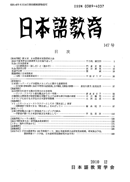The present study examines the effectiveness of a teaching method that is based on the theories and results of second language acquisition research. The effects of an input-based instruction method called Processing Instruction, which is supported by second language acquisition research, were compared with those of the traditionally used output-based instruction, which focuses on learners' production of the language, by analyzing test results in comprehension and production of Japanese adjective comparisons.
The results indicated that the learners in both groups gained from the instruction. Nevertheless, the instructional gain was greater for the learners who received Processing Instruction than those who received output-based instruction, based on comprehension and production tests, even with the absence of the output practice in Processing Instruction. This result suggests that instruction methods in accordance with learners' cognitive processes enhance and support the learners' successful acquisition of the language.
View full abstract
